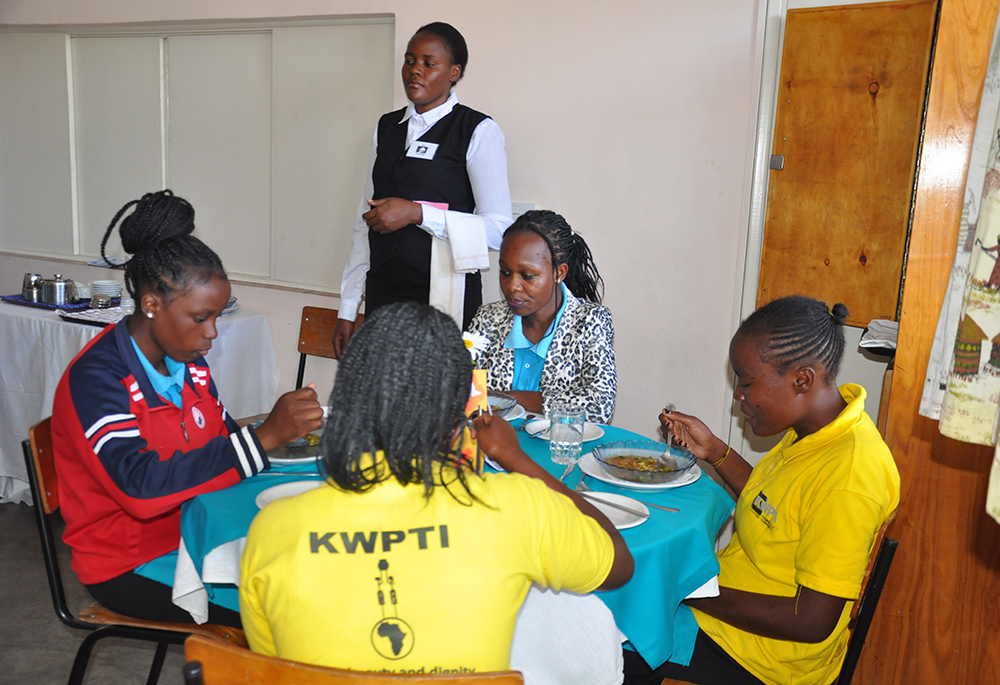
Catering Students are pictured in class at the Kariobangi Women Promotion Training Institute, run by the Comboni Missionary Sisters. The institute helps young women in Nairobi's low-income areas. After the training, the students find employment or start their own businesses. (Lourine Oluoch)
Noise from welding machines, shouts by mechanics working in a garage, motorbike riders, small businesses displaying motorbike parts and secondhand clothes, and food vendors along the busy Outer Ring Road welcome you to the mid-morning excitement of Kariobangi, a sprawling low-income residential estate in Eastlands, Nairobi.
In the heart of that daily bustle is the Kariobangi Women Promotion Training Institute, nestled within the Holy Trinity Catholic Church compound alongside the Comboni Missionary Sisters convent and the Kariobangi Catholic Dispensary.
The Kariobangi Women Promotion Training Institute, run by the Comboni Missionary Sisters, helps young women in the low-income areas of Kariobangi, Korogocho, Kariadudu, Huruma, Ngei, and Kariobangi South, offering them skills in tailoring and dressmaking, hairdressing, and catering.
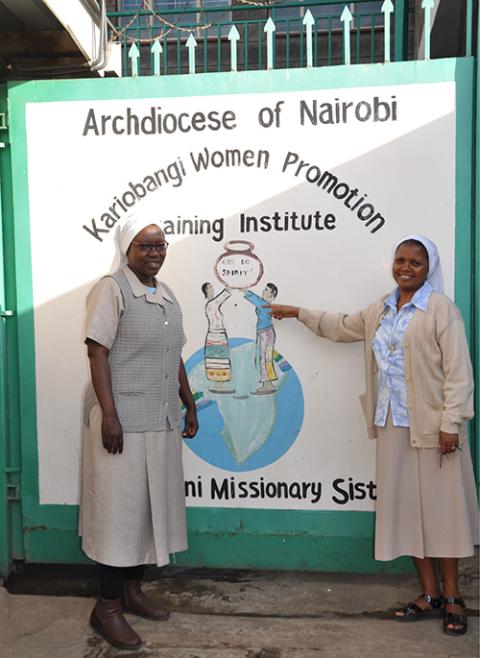
Sr. Mary Kevin Avaro, executive director of the institute, and Sr. Manna Berhe, a student on attachment at the institution. Comboni Missionary Sisters have been running the project since 1992. (Lourine Oluoch)
This is not your usual college.
A child care center on the first floor of the two-story building that houses the Kariobangi Women Promotion Training Institute is a vital part of the project. The center takes care of babies so their mothers are free to attend classes.
"If you don't take care of the child, the mother will not come," Sr. Mary Kevin Avaro, the executive director of the Kariobangi Women Promotion Training Institute, told Global Sisters Report. The Comboni Missionary Sisters invite their female students to bring their children younger than 3 for them to look after, "so you can go to study so that your future can be a little better."
The project owes its beginnings to a vibrant pro-life movement at the Holy Trinity Catholic Parish of Kariobangi, that in the early '90s convinced many pregnant young women not to get abortions.
However, they did not know what to do with the women or how to help them take care of the children they were expecting. Therefore, "the parishioners decided to start a project that would enable the women to support themselves," Avaro said.
The parish started a project where the women would come in for half a day for counseling and to learn knitting. Later, they would visit the nearby Kariobangi Market to learn dressmaking from tailors, but the learning was not adequate, and the support from the parishioners was not consistent.
Advertisement
In 1992, the parish leaders requested the Comboni Missionary Sisters to take over the project, and with support from the organization Manos Unidas (United Hands), the congregation constructed the building that hosts the institution and brought order to the training of the women.
It started by offering courses in tailoring, bead-making, and knitting. The sisters also introduced life skills classes, including character formation, spiritual formation and counseling, and basic business and computer skills.
Today, the Kariobangi Women Promotion Training Institute is recognized by the Technical and Vocational Educational and Training Authority, or TVETA, offering courses in fashion and design, food and beverage production, and hairdressing and beauty therapy.
Avaro told GSR that as soon as the students arrive at the institution, they start lessons in character formation.
"We have several workshops for behavior change, and we have counseling services because our people need that," she said.
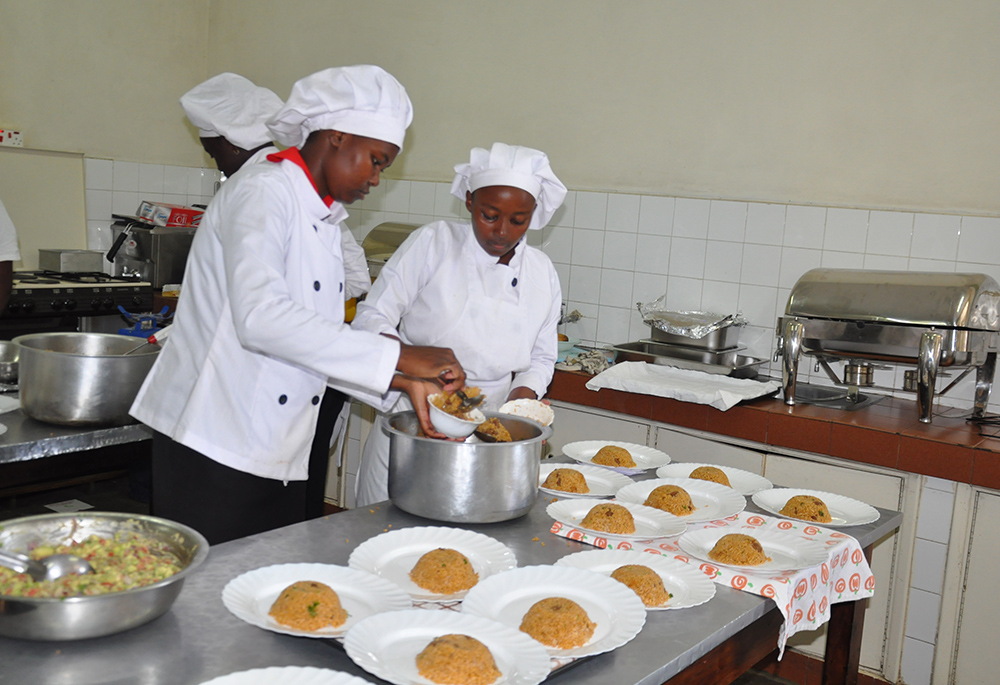
Students of catering are pictured getting food ready for a service class. The catering class serves while the rest of the school acts as clients. The food and equipment are provided free to the students by the institution. (Lourine Oluoch)
"When you come in, you are guided and counseled, so you know yourself, so the things from outside don't affect you," Rose Muthoni, a student of food and beverage production, said. "The mentorship is good. In case you have something that is bothering you, you are able to share it with the counselors."
The institute also provides grooming services to make students feel comfortable being with the others, as well as tea every day because some arrive hungry.
A social worker visits their homes to know where they come from and to assess their situation.
"You may think that they don't want to pay school fees, then you realize there is a problem," Avaro said. "By tradition, we don't send them home."
Avaro added that the institute advertises to organizations that sponsor students in need, and while the majority are sponsored by organizations, some are not, and it is a challenge.
The Association of Sisterhoods of Kenya, or AOSK, sponsored 10 students having difficulties paying the school fees, funding the institution with a psychosocial workshop, and buying computers.
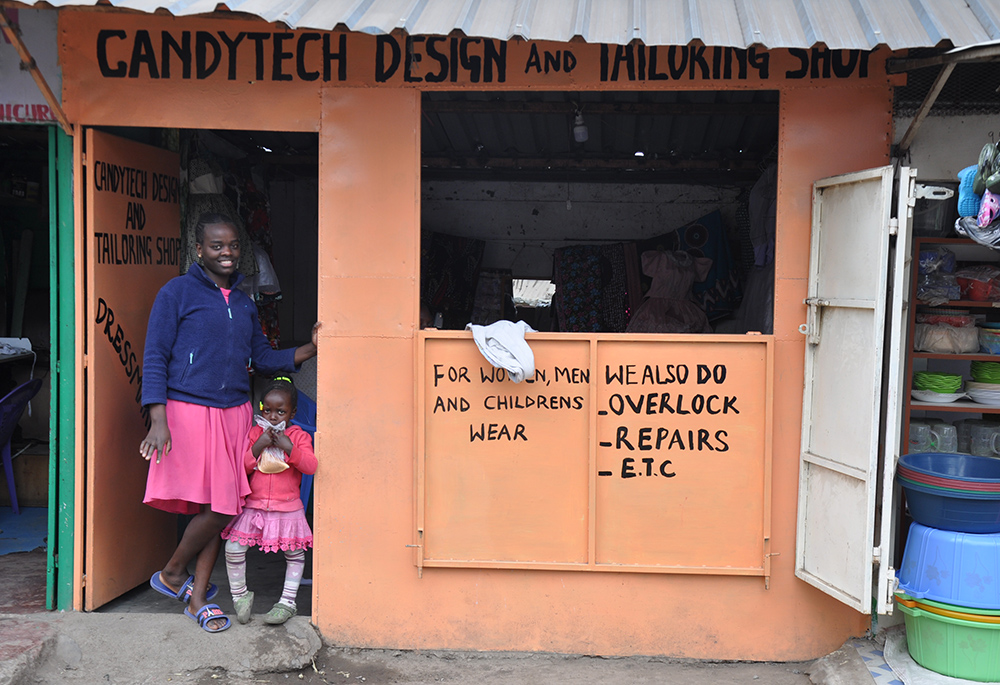
Lynn Chepng'eny and her daughter are pictured at the dressmaking business she and Scovia Nakato started in Kariobangi North in Nairobi. The Association of Sisterhoods of Kenya sponsored the tailoring business by providing machines and assorted materials and paid rent to start them off. (Lourine Oluoch)
Twenty-one-year-old Lynn Chepng'eny and 22-year-old Scovia Nakato, fashion and design graduates, are beneficiaries of the institution. Together, they have started a dressmaking business courtesy of the AOSK, which sponsored their second year of training and helped them build the business that began operating in May 2023. They make clothes for children and adults. Although the business has started slowly, Nakato believes it will catch up.
"That is God because we had no hope. I would like to thank the sisters for helping girls, and I pray they help others, too. May God bless them," Nakato said.
For Chepng'eny, life has not been easy, and the business gives her hope of making life better for herself and her 3-year-old daughter. The pro-life office at the Kariobangi parish rescued Chepng'eny and her 2-week-old child from the streets and took her to shelter at the Missionaries of Charity of Mother Teresa home in the Huruma slums.
When Chepng'eny arrived, she told the sisters that she wanted a job that would help support her child, but they insisted that she was too young and needed to learn a skill.
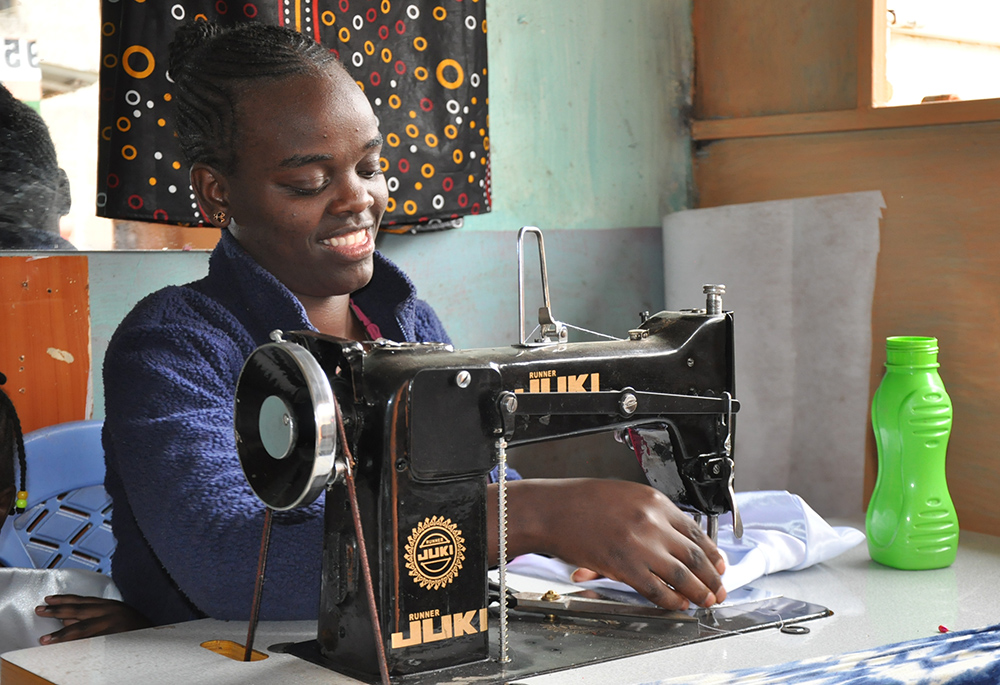
Lynn Chepng'eny is pictured at her dressmaking business in Kariobangi North in Nairobi. Apart from dressmaking and tailoring skills, she says she benefited from counseling and character formation classes at the Kariobangi Women Promotion Training Institute. (Lourine Oluoch)
"The school has helped me because now I know how to do dressmaking, and I have my job. I live in a rented house. Apart from dressmaking, I benefited from the character formation classes because I had very low self-esteem at the time. I was very young, and I thought I was the only one who had a child. I was ashamed. I came to accept that I had a child," Chepng'eny said.
Scovia Miriam, a married student with two children from Korogocho, was sponsored to the school by a well-wisher, a neighbor who volunteered to help her.
"When I came, I thought I was the only one going through hardship, but I found others, and that gave me the psych to go on," Miriam said.
"The sisters treated us with respect like we are people's children."
Koseki Joyce, who teaches food and beverage service and sales, has taught in 13 different schools, and said, "This Catholic-sponsored school is unique." She noted that they live as a community and respect the students. "Their priority is the learners, and they take care of them very much."
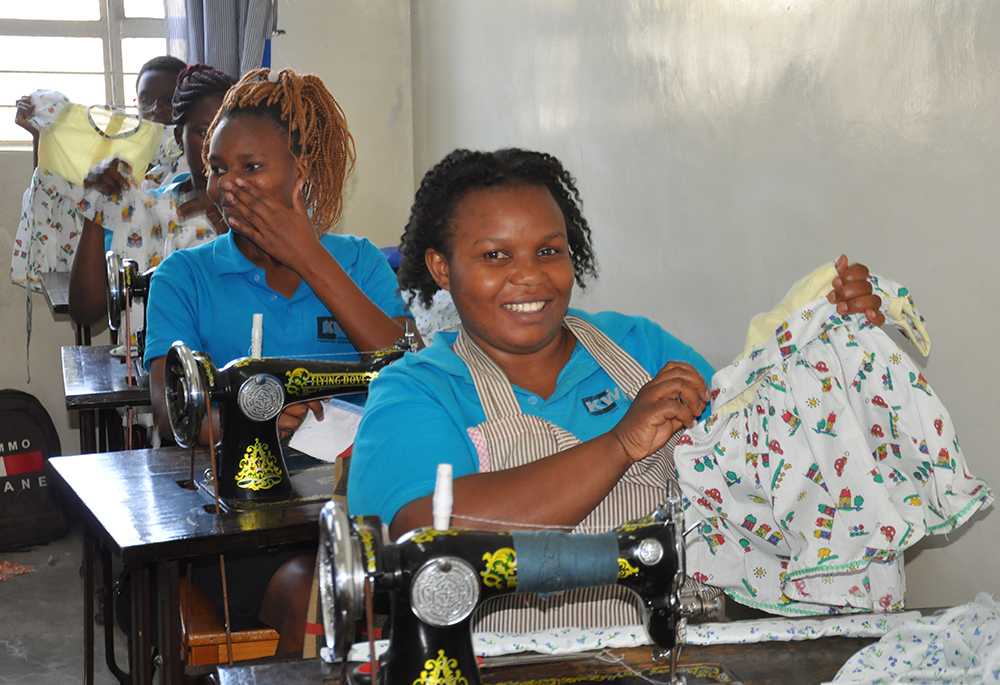
A student displays her work at the Kariobangi Women Promotion Training Institute. The school provides free materials because most students come from poor backgrounds and are not able to buy the materials if asked. (Lourine Oluoch)
Those who manage the school told GSR that it is challenging to run the project because of expenses, including providing equipment and the materials students need. And the school fee is less than other colleges. To support the project, the school runs a production unit that produces clothes, uniforms, game kits, and tie-dye products, which are then sold to the public to help subsidize the costs of running the school. The production unit has employed former students at the institution and often brings in the students to help with the production when the orders placed are large.
After the training, some students work in the local markets, some open their own businesses, and others are employed by the school as trainers or work in the production unit.
Mwangi Kuria, a teacher at St. John's School in Kariobangi said, "KWPTI has done a lot. There are students who after high school could not progress because of poverty, but then joined the project, and the training changed their lives. They become independent and very productive. Our girls have gone through training and are now working in big hotels, or the Export Processing Zone [EPZ], or they have their own salons, so they are becoming mentors to those growing up."
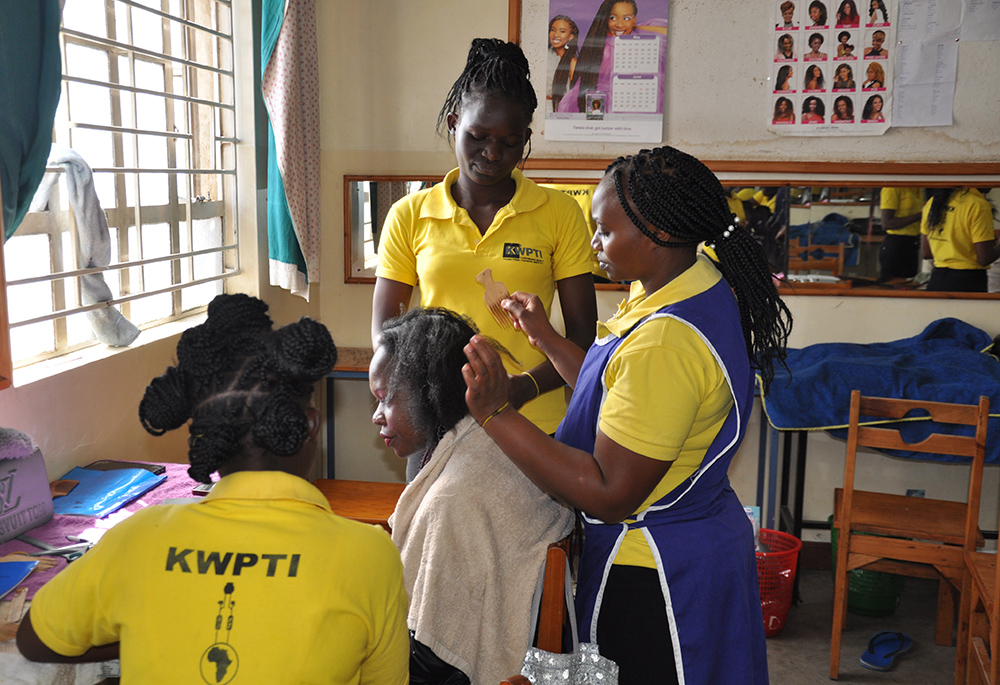
Students of hairdressing plait hair at the institute. The majority of students come from the low-income areas of Kariobangi, Korogocho and Huruma. The institute owes its beginnings to a zealous pro-life movement in the Kariobangi parish that saw the need to support young pregnant women. (Lourine Oluoch)
Sr. Manna Berhe, a Comboni missionary who is a student on attachment at the institution (similar to an internship), admires the "can-do spirit" in the women and that the women are encouraged to fulfill the training they get. She is happy to see the majority of them remain there to work.
Avaro noted that the school follows students to see how they are faring after the training and that the rate of employment and self-employment for students was 80-85% before the coronavirus. With the coronavirus, it went down to 50%, "and now it's beginning to go up again around 75%."
Whether the Kariobangi Women Promotion Training Institute has achieved its purpose of starting a project that would enable the girls to support themselves, Avaro said, "I think we have achieved a lot with this institution because many women have been supported."








